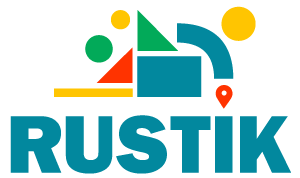Overarching objective
To enable rural communities’ actors and policy makers to design better strategies, initiatives and policies fostering sustainability transitions of rural areas, through advancing our understanding of different rural functionalities, characteristics and future scenarios of rural areas, their potentials and challenges.
- Consortium: 31 partners
- Duration: September 2022 to August 2026 (48 months)
- Budget: EU contribution 5 838 693.88€ + UKRI 1 099 629.70€ = Total RUSTIK budget 6 938 323.58 €
- Scale: partners from 12 European countries involved; 14 pilot regions in 8 EU countries and 2 non-EU countries
- Funded by: Horizon Europe. UK contributions to this project are funded by Innovate UK on behalf of UK Research and Innovation
- Call: CL6-2021-COMMUNITIES-01-01: Grasping rural diversity astrengthening evidence for tailored policies enhancing the contribution of rural communities to ecological, digital and social transitions (RIA)
Central key transitions on which RUSTIK will focus on:
Socio economy
- Demographic change
- Economic diversification processes
- Deepening inequalities
- Economic diversification processes
- Deepening inequalities
Climate change & environment
- Ensuring a neutral or positive environmental impact of the food chain.
- Ensuring food security, nutrition and public health.
- Preserving the affordability of food, while generating fairer economic returns in the supply chain.
- Ensuring food security, nutrition and public health.
- Preserving the affordability of food, while generating fairer economic returns in the supply chain.
Digitalisation
- Addressing the digital divide between urban and rural areas in terms of infrastructure, and human capital.
- Finding ways to use digital technologies to address territorial inequalities.
- Finding ways to use digital technologies to address territorial inequalities.
Rural functions
Five types of rural functions are RUSTIK’s starting point for characterising the diversity of rural areas and their capacity to respond to these transitions.
- Provision of ecosystem services
- Specific innovative infrastructure and services
- Provision of high qualitative and accessible land-based products
- Distributed and diversified production system
- Social capital, cultural assets

